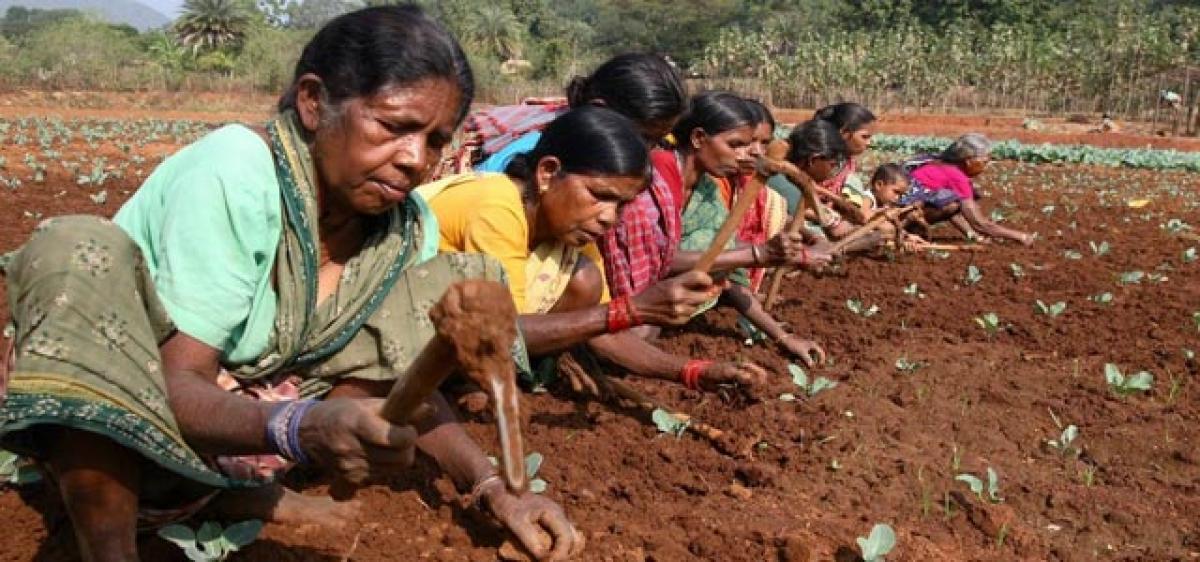Live
- Congress killers of Samvidhan: Modi
- Bejan Daruwalla’s horoscope
- Study warns: Ultra-processed foods may accelerate biological age
- CM pledges more political opportunities to Madigas
- Vizag attracts tourists as much as Kashmir
- Year-Ender 2024 Guide: Home remedies to relieve Period Pain.
- All India crafts mela begins today
- TTD gears up for Vaikunta Ekadasi fete
- Express Yourself
- Rajadhiraaj: Love. Life. Leela
Just In

The role of agricultural workers in Indian farming is paramount, unlike in small holdings-based South-East Asian and Latin American countries or large holdings-centered American and Australian farming.
The situation at ground level warrants that there is a dire need to ease growing disquiet between farmers and workers, the two major stakeholders of agriculture
The role of agricultural workers in Indian farming is paramount, unlike in small holdings-based South-East Asian and Latin American countries or large holdings-centered American and Australian farming. Traditionally, agricultural wage workers are those who solely depend for their livelihood on farming without any own farm land. Of late, the description is applied to those whose farm wages comprise more than 50 per cent of their income. As per latest surveys, more than 56 per cent of these workers are landless. Interestingly, in intensive crop production areas, a large number of them opt for tenancy farming also for livelihood security and social dignity.
Many commentators or expert commissions attribute agricultural crisis to lack of or insufficient technologies, market forces, banking systems, environment or climate changes, human health, infrastructures, insurance etc. They pay little attention to the farm workers. Even the new AP government, which has started constructing its capital city in a highly resourceful and most fertile belt, has safeguarded only the interests of land owners but ignored the plight of farm workers who lost their livelihood security.
More and more use of mechanisation is only adding to the woes of agricultural workers as it is resulting in shrinking of work days. In the absence of work, the workers, even small farmers, eagerly look to MGNREGA and public distributing systems for work and food security. It is a common refrain of farmers, whose incomes are falling by the day, that their high indebtedness is due to high wages of workers and non-availability of workers during critical farm operations. As per them, work guarantee schemes are largely unproductive.
However, the workers react differently. They rue that they hardly get 75-80 work days in a year, mostly around sowing and harvesting periods. Hence, they need to fend for themselves for the remaining period of the year and look for more wages to sustain themselves. They point out that the land owners get bank loans and government support, while the workers hardly get support even if they opt to turn farmers themselves or take to animal husbandry. Periodically, loan waiver schemes are also extended to farmers, they point out, making a comparison. Even when a tenant farmer resorts to suicide, his family hardly gets support from government, since he is not in the list of farmers or records.
The small favour done by government just to create at least 100 work days in a year should not be root cause of troubles to farmers, they contend. Some of the workers, involved in the rural surveys interacted and commented, “we never aspire for land distribution, or for implementation of Tenancy Control Act. We want to eat two square meals a day as the farmers do.
We want better education for our children and better healthcare for our families. We are not aspiring to give huge amounts as dowry to our daughters or send our children to cities or foreign countries for employment or education as the land owners do. We want socially dignified life. We should not be identified on the name of our caste. We should be treated equally in all respects.”
The development model adopted in terms of children education, medical treatments and consumerism, has percolated to the workers level, which naturally led to demands for reasonable remuneration for their work. The situation at ground level warrants that there is a dire need to ease growing disquiet between these two major stakeholders of agriculture, by rationalising land relations and implementing tenancy control acts, until secondary and tertiary sectors absorb the workforce to create reasonable livelihood security.
Advent of new technologies and greater mechanisation, besides their perennial woes, should not lead to fall in number of work days for those who are solely dependent on their wages. It is imperative for governments and authorities to safeguard their interests. (The Writer is Convener, Rythu Rakshana Vedika, Guntur)
By Prof N Venugopal Rao

© 2024 Hyderabad Media House Limited/The Hans India. All rights reserved. Powered by hocalwire.com







